-
 Bitcoin
Bitcoin $112400
-1.07% -
 Ethereum
Ethereum $3409
-3.27% -
 XRP
XRP $2.784
-6.60% -
 Tether USDt
Tether USDt $0.9997
-0.03% -
 BNB
BNB $739.3
-2.09% -
 Solana
Solana $158.0
-2.90% -
 USDC
USDC $0.9998
-0.02% -
 TRON
TRON $0.3213
-0.94% -
 Dogecoin
Dogecoin $0.1929
-5.01% -
 Cardano
Cardano $0.6974
-2.82% -
 Hyperliquid
Hyperliquid $36.69
-2.31% -
 Sui
Sui $3.327
-4.80% -
 Stellar
Stellar $0.3672
-5.18% -
 Chainlink
Chainlink $15.65
-3.07% -
 Bitcoin Cash
Bitcoin Cash $525.0
-1.68% -
 Hedera
Hedera $0.2291
-6.00% -
 Avalanche
Avalanche $20.91
-2.96% -
 Ethena USDe
Ethena USDe $1.000
0.00% -
 Toncoin
Toncoin $3.520
-1.12% -
 UNUS SED LEO
UNUS SED LEO $8.968
0.14% -
 Litecoin
Litecoin $105.7
0.26% -
 Shiba Inu
Shiba Inu $0.00001181
-1.79% -
 Polkadot
Polkadot $3.492
-2.08% -
 Uniswap
Uniswap $8.800
-3.10% -
 Dai
Dai $0.9999
-0.01% -
 Monero
Monero $289.9
-3.17% -
 Bitget Token
Bitget Token $4.243
-1.27% -
 Pepe
Pepe $0.00001006
-3.67% -
 Cronos
Cronos $0.1248
-5.68% -
 Aave
Aave $249.7
-2.50%
Are Bitcoin ETFs trading hours synchronized with traditional stock markets?
Bitcoin ETFs follow specific stock exchange hours, not Bitcoin's 24/7 trading, leading to potential price discrepancies and limited trading opportunities.
Mar 27, 2025 at 04:28 am
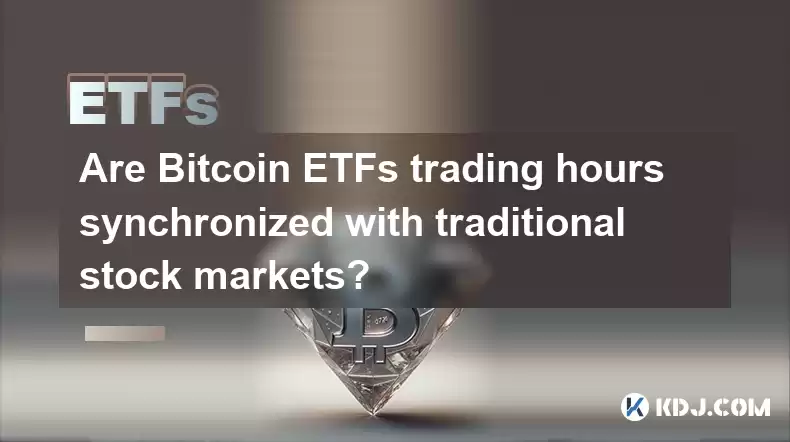
Understanding Bitcoin ETF Trading Hours
The trading hours of Bitcoin Exchange-Traded Funds (ETFs) are a crucial aspect for investors accustomed to the traditional stock market's schedule. Unlike Bitcoin itself, which trades 24/7, Bitcoin ETFs are subject to the regulations and operating hours of the exchange on which they are listed. This means their trading hours are not synchronized with the global, continuous trading of Bitcoin. Instead, they follow the specific hours of operation of the respective stock exchange.
Exchange-Specific Trading Hours
The trading hours of a Bitcoin ETF are entirely dependent on the stock exchange where it is listed. For example, if a Bitcoin ETF is listed on the New York Stock Exchange (NYSE), its trading hours will mirror the NYSE's hours, typically 9:30 AM to 4:00 PM Eastern Time (ET), Monday through Friday. Similarly, a Bitcoin ETF listed on the Nasdaq will follow the Nasdaq's trading hours. This means that outside of these hours, you cannot buy or sell the ETF. It's crucial to check the specific exchange listing for precise trading times.
Implications of Non-Synchronization
The lack of synchronization between Bitcoin ETF trading hours and the continuous trading of Bitcoin itself has several implications. First, it limits trading opportunities for investors accustomed to round-the-clock access. Second, it means that price discovery for the ETF might lag behind the actual Bitcoin price, particularly during periods of significant volatility outside of regular trading hours. This lag can create potential arbitrage opportunities, but also introduces risk.
Accessing Bitcoin Outside of ETF Trading Hours
If you need to access Bitcoin exposure outside of the ETF's trading hours, you'll need to utilize other methods. This could involve direct Bitcoin trading on cryptocurrency exchanges, which operate 24/7. However, this approach carries different risks, including higher security concerns and potential exposure to greater price volatility. Direct Bitcoin trading requires a different level of technical understanding and risk management than ETF investing.
The Role of Market Makers
The price of a Bitcoin ETF is determined by the forces of supply and demand, just like traditional stocks. However, market makers play a crucial role in ensuring liquidity during trading hours. These market makers provide bids and offers, helping to maintain a fair and orderly market. The effectiveness of these market makers is important to the price discovery process during trading hours. Outside of trading hours, however, this mechanism is not active.
Understanding Price Discrepancies
Because of the differing trading hours, there is a potential for price discrepancies between the ETF and the underlying Bitcoin price. This difference can be caused by events happening outside of the ETF's trading hours. For example, a significant news event or a large price movement in Bitcoin during the night could lead to a price gap when the ETF market opens. Investors should be aware of this potential for price discrepancies.
Factors Affecting ETF Trading Hours
Several factors contribute to the trading hours of a Bitcoin ETF. These include the regulatory environment, the exchange's rules and policies, and the overall market structure. Changes in any of these factors could potentially impact the trading hours of a Bitcoin ETF in the future. It's important to stay informed about any changes that might affect your investment strategy.
Comparing to Traditional Stock Markets
The trading hours of Bitcoin ETFs are similar in principle to those of traditional stock market ETFs. Both are subject to the hours of operation of the exchange on which they are listed. However, the underlying asset – Bitcoin – has a fundamentally different trading pattern, leading to the aforementioned discrepancies and considerations. Understanding this difference is key to effective investment management.
Step-by-Step Guide to Checking ETF Trading Hours
To find the exact trading hours of a specific Bitcoin ETF:
- Locate the ETF's exchange listing: Find the official website of the exchange (NYSE, Nasdaq, etc.) where the ETF trades.
- Search for the ETF ticker symbol: Use the ETF's ticker symbol to find its detailed information page.
- Check the trading hours section: The exchange's website will typically specify the daily trading hours for that ETF.
- Note any exceptions: Be aware of potential exceptions, such as holidays or special trading sessions.
Frequently Asked Questions
Q: Can I buy Bitcoin outside of ETF trading hours?
A: Yes, you can buy Bitcoin directly on cryptocurrency exchanges, which operate 24/7. However, this involves different risks and requires a different level of technical expertise.
Q: Why aren't Bitcoin ETF trading hours 24/7?
A: Bitcoin ETFs are securities traded on regulated exchanges, which operate during specific hours. The 24/7 nature of Bitcoin itself does not dictate the trading hours of the ETF.
Q: What happens if Bitcoin's price changes significantly outside of ETF trading hours?
A: A significant price change outside of trading hours may result in a price gap when the ETF market opens. The opening price will reflect the overnight movement.
Q: Are there any risks associated with investing in Bitcoin ETFs?
A: Yes, investing in Bitcoin ETFs carries risks, including market volatility, regulatory uncertainty, and the potential for price discrepancies between the ETF and the underlying Bitcoin price.
Q: How do I find the trading hours of a specific Bitcoin ETF?
A: Consult the website of the stock exchange where the ETF is listed. Look for the ETF's ticker symbol and find the trading hours information on its details page.
Q: Is there a way to mitigate the risk of price discrepancies?
A: While complete mitigation is impossible, staying informed about Bitcoin's price movements outside of ETF trading hours can help investors manage their expectations and risk. Diversification is also a key risk management strategy.
Disclaimer:info@kdj.com
The information provided is not trading advice. kdj.com does not assume any responsibility for any investments made based on the information provided in this article. Cryptocurrencies are highly volatile and it is highly recommended that you invest with caution after thorough research!
If you believe that the content used on this website infringes your copyright, please contact us immediately (info@kdj.com) and we will delete it promptly.
- Ruvi AI: The AI Token on Cardano Set to Dominate After CMC Listing
- 2025-08-03 04:50:12
- Altcoins in the Spotlight: Cardano, Shiba Inu, and the Quest for Crypto Supremacy
- 2025-08-03 05:30:12
- Litecoin, USDC, and Mining in 2025: A New Yorker's Take
- 2025-08-03 05:50:12
- Bitcoin, MicroStrategy, and Institutional Confidence: A Bullish Trifecta?
- 2025-08-03 04:30:12
- Ruvi AI Token: Price Hike Imminent After Presale Milestone?
- 2025-08-03 04:30:12
- Ruvi AI: The Millionaire Maker with a Price Spike on the Horizon?
- 2025-08-03 02:50:12
Related knowledge
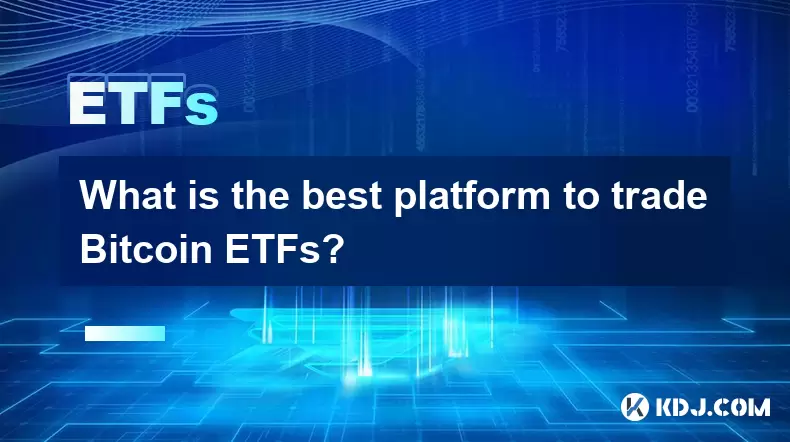
What is the best platform to trade Bitcoin ETFs?
Jul 23,2025 at 04:14am
Understanding Bitcoin ETFs and Their Role in TradingBitcoin Exchange-Traded Funds (ETFs) have gained significant traction among traditional and crypto...
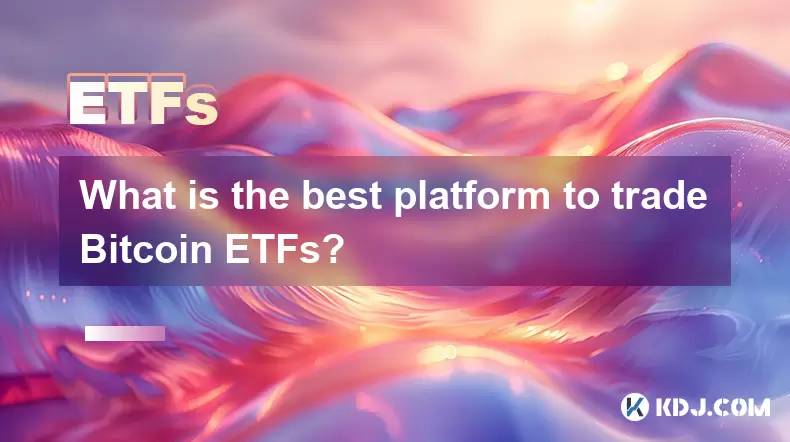
What is the best platform to trade Bitcoin ETFs?
Jul 17,2025 at 03:50pm
Understanding Bitcoin ETFs and Their Role in the MarketBitcoin Exchange-Traded Funds (ETFs) are investment vehicles that track the price of Bitcoin wi...
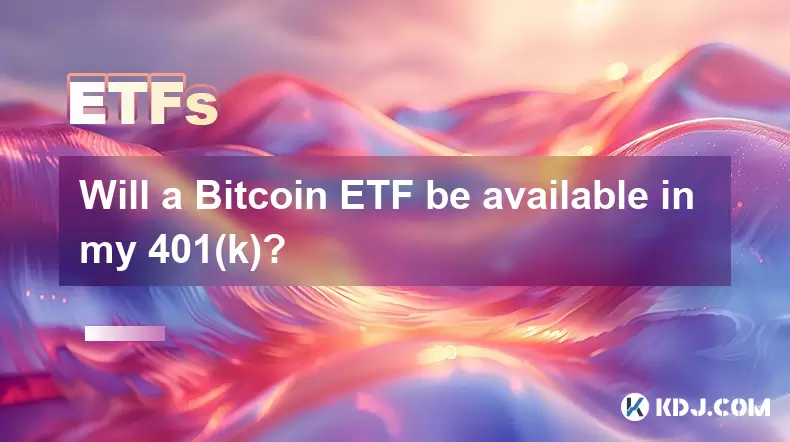
Will a Bitcoin ETF be available in my 401(k)?
Jul 17,2025 at 10:42pm
What is a Bitcoin ETF?A Bitcoin ETF (Exchange-Traded Fund) is an investment vehicle that tracks the price of Bitcoin without requiring investors to di...
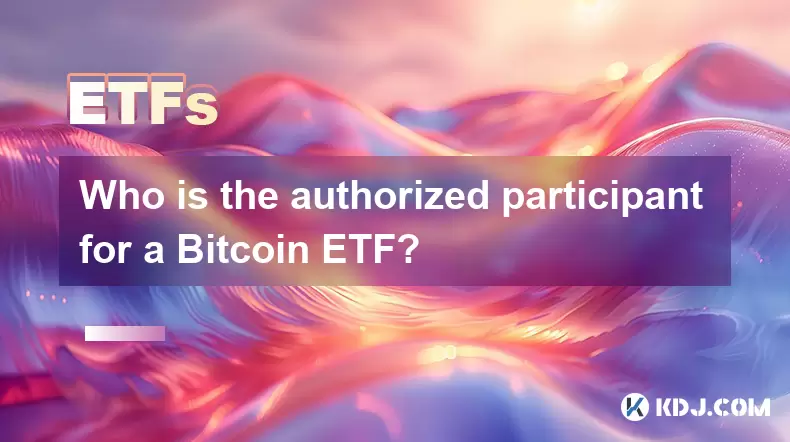
Who is the authorized participant for a Bitcoin ETF?
Jul 18,2025 at 12:42am
Understanding the Role of Authorized Participants in Bitcoin ETFsIn the context of Bitcoin Exchange-Traded Funds (ETFs), an authorized participant (AP...
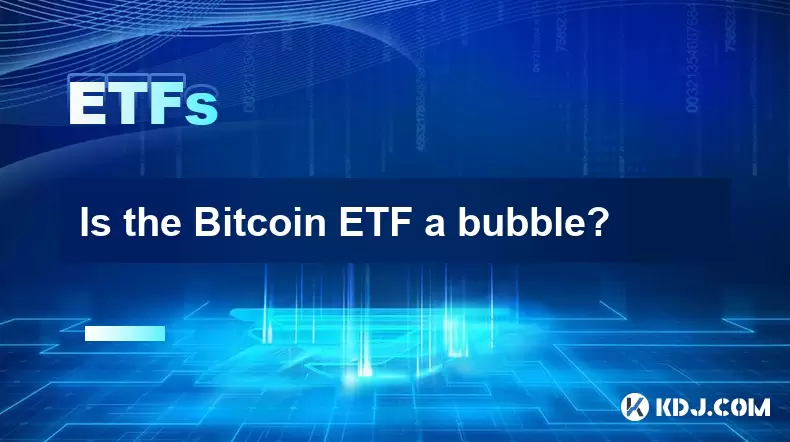
Is the Bitcoin ETF a bubble?
Jul 20,2025 at 06:57am
Understanding the Bitcoin ETF ConceptA Bitcoin Exchange-Traded Fund (ETF) is a financial product that aims to track the price of Bitcoin without requi...
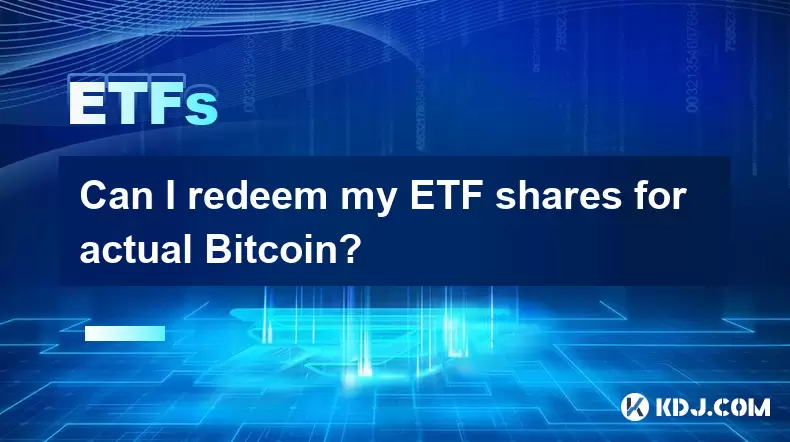
Can I redeem my ETF shares for actual Bitcoin?
Jul 17,2025 at 03:14pm
Understanding ETF Shares and Their Relation to BitcoinExchange-Traded Funds (ETFs) have become a popular investment vehicle for those looking to gain ...

What is the best platform to trade Bitcoin ETFs?
Jul 23,2025 at 04:14am
Understanding Bitcoin ETFs and Their Role in TradingBitcoin Exchange-Traded Funds (ETFs) have gained significant traction among traditional and crypto...

What is the best platform to trade Bitcoin ETFs?
Jul 17,2025 at 03:50pm
Understanding Bitcoin ETFs and Their Role in the MarketBitcoin Exchange-Traded Funds (ETFs) are investment vehicles that track the price of Bitcoin wi...

Will a Bitcoin ETF be available in my 401(k)?
Jul 17,2025 at 10:42pm
What is a Bitcoin ETF?A Bitcoin ETF (Exchange-Traded Fund) is an investment vehicle that tracks the price of Bitcoin without requiring investors to di...

Who is the authorized participant for a Bitcoin ETF?
Jul 18,2025 at 12:42am
Understanding the Role of Authorized Participants in Bitcoin ETFsIn the context of Bitcoin Exchange-Traded Funds (ETFs), an authorized participant (AP...

Is the Bitcoin ETF a bubble?
Jul 20,2025 at 06:57am
Understanding the Bitcoin ETF ConceptA Bitcoin Exchange-Traded Fund (ETF) is a financial product that aims to track the price of Bitcoin without requi...

Can I redeem my ETF shares for actual Bitcoin?
Jul 17,2025 at 03:14pm
Understanding ETF Shares and Their Relation to BitcoinExchange-Traded Funds (ETFs) have become a popular investment vehicle for those looking to gain ...
See all articles

























































































